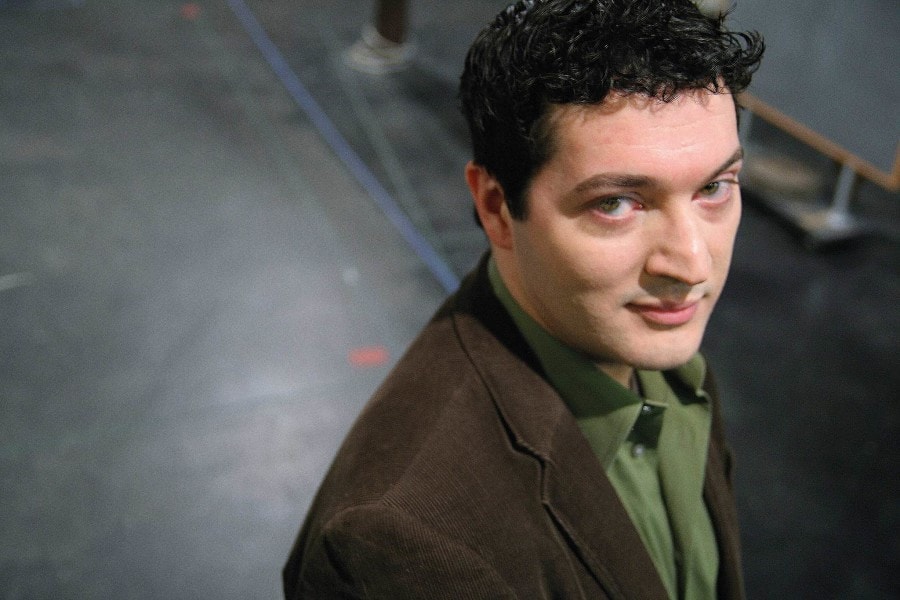Last week PJ Paparelli, artistic director of Chicago’s American Theater Company, died in a car accident while on vacation in Scotland. He was just 40 years old. We asked playwright Stephen Karam, a frequent collaborator of Paparelli’s, to write this tribute. —Ed.
PJ’s theatrical creations are a lot like the creator himself: bold, complex, passionate, ridiculous, thoughtful, dark, unpredictable, formidable, tough, compassionate, demanding, generous—an impossible mix that always yielded extraordinary results.
The current season at American Theater Company, comprised entirely of world and Chicago premieres, reflects his brave artistic leadership. PJ didn’t just talk about the importance of diversity and socially conscious theatre; in his short time at ATC, he diversified the ensemble, brought in new artists and world premieres, and invested heavily in his theatre’s American Mosaic program, which serves more than 700 Chicago public school students annually. As a writer/director, his brilliance at transforming vital, epic and unwieldy themes into cogent narratives is on display in his latest work, The Project(s). Chronicling the turbulent history of public housing in Chicago, The Projects(s) is a hit with both critics and audiences.
I first met PJ when I was 22, a few weeks out of college, at Utah Shakespeare Festival. As an intern, I was inexplicably playing Jupiter in an otherwise well-cast production of Cymbeline. PJ thought I was a terrible actor, but saw on my resume that I was a writer and—most notably—from Scranton, Pa. I couldn’t believe I’d found a kindred theatrical spirit from my hometown, and in Utah, no less. PJ was already the associate artistic director at Shakespeare Theatre Company in Washington, D.C., and working with his mentor, Michael Kahn. He taught me that making it in this business wasn’t about waiting for a handout or a lucky break; it was about rolling up your sleeves and getting to work.
I’ll never forget PJ’s preternatural vigor and freakish determination when working on a play. During a workshop of columbinus, a play we cocreated at the North Carolina School for the Arts, Winston-Salem was hit by a massive ice storm. The power went out in our dorm rooms. I was freezing and unsure how we would make it through the night without heat. We couldn’t afford a hotel. In the next room, I discovered PJ lighting candles and putting large homemade tinfoil shades around them to help reflect more light. “This way we can still get work done,” he said. I have since given him hell (and we’ve both laughed a lot) about the time he made us work in the dark (in sub-freezing temperatures), but the truth is we had a breakthrough or two that night.
PJ’s indefatigability likely stemmed from the fact that he’d never been handed anything in his life. Each of his successes was deeply earned. In turn, he required those around him also pour their blood and guts into building work with the power to affect change. His work ethic made the seemingly impossible happen again and again: theatre of the highest caliber on a storefront budget.
Our final collaboration was the world premiere of The Humans at ATC last fall. The play explores the fears of a family from Northeastern Pennsylvania, and it was especially meaningful to partner up with PJ, who by this time, after 13 years of theatrical adventures, was like an older brother to me (complete with the requisite fighting). The play gave us a chance to reflect on our complex relationship to our hometown, our families, our roots. It was opportunity for us to go home again, in a sense. We cracked countless jokes about Scranton over the years, but we’d also grown to love and value our hometown and the ways it has indelibly shaped us. This common ground gave us a safe place to build art; we were free to disagree (a lot) and use our different creative strengths to push each other to be better.
After PJ’s death, ATC’s production manager sent me and the cast a video that PJ shot of us an hour before The Humans‘s opening night curtain. With the entire cast gathered pre-show, PJ asked us to mirror the onstage ritual of the Blakes, the fictional family from The Humans. Their Thanksgiving tradition is simple, if weird: Each member of the family takes a turn naming one thing they are grateful for, then smashes a peppermint pig for good luck.
Backstage, we each passed around the pig and a tiny mallet and expressed our deep gratitude for the chance to work together, then blissfully shattered the porcine peppermint. Like all special moments in the theatre, the 15 minutes in that dressing room were deeply felt, inexplicably magic, then gone forever.
When it came time for PJ to speak, he reflected on his trademark belief that great theatre, perhaps only rivaled by religious faith, has the power to truly affect change. He noted: “We’re all put on this planet to do something, and it’s not to have a self-centered career, it’s actually to make people’s lives better…”
Through his life and his body of work, PJ accomplished just that.


